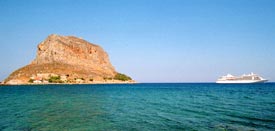|
By Durant Imboden

ABOVE: The Rock of Monemvasia
with a cruise ship, the
Silver
Whisper, anchored offshore. (The Greek
mainland is just to the left of the photo.)
History
Monemvasia dates back to the 6th Century, when inhabitants of
ancient Laconia (now a Greek province) settled on a rock that had been split
from the mainland by an earthquake in 375 AD. The rock offered a refuge from the
Slavic invaders who dominated much of Greece from about 500 to 700 AD. Over
time, Monemvasia developed into a major Byzantine trading port. The Venetians
took control in 1464, when they built a massive fortress high above the town.
(You can visit the ruined citadel today, if you have the time and endurance for
a long hike to the rock's summit.)
In the 15th Century, when the Turks invaded Laconia, the walled
enclave of Monemvasia maintained a successful blockade for a hundred years. The
Turks finally seized the town in 1540 and held it until 1690, when the Venetians
once again took over until possession reverted to the Turks in 1715. Slightly
more than a century later, in 1821, Monemvasia was liberated during the Greek War of
Independence and the Turkish occupiers were massacred.
The town declined in importance during the 19th and 20th
Centuries, and most of its remaining population either left the area or
resettled in the small port 2 km away on the mainland (which is now known as
Gefira, Yefira, or the port of Monemvasia).
Malmsey wine
An interesting footnote to Monemvasia's history is the town's
role in the
Malmsey
wine trade. Malmsey, a sweet dessert wine made from the Malvasia grape,
originated in Monemvasia, which exported large quantities of Malmsey to England
in the 15th Century. Today, the name "Malmsey" refers to a type of Portuguese
Madeira wine grown from the same grape.
Next page:
The town today
|